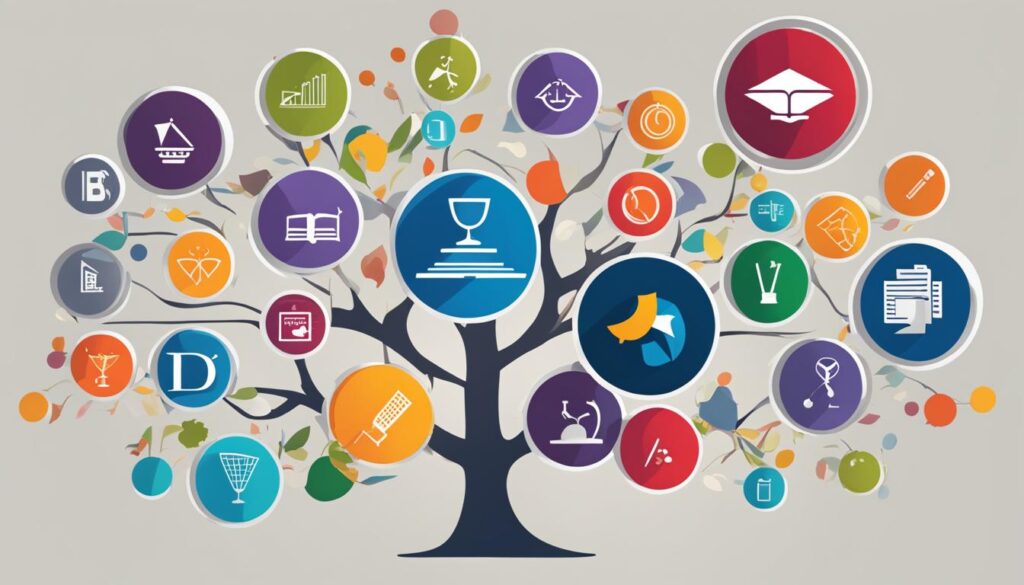The Bachelor of Education Teacher Education (B.Ed. (Teacher Education)) program is your essential step toward a fulfilling career as a teacher. This comprehensive education degree program equips you with the skills and knowledge needed to excel in the teaching profession. Whether you’re considering a career switch or wanting to advance in your current profession, the B.Ed. in Teacher Education is the perfect path forward to achieve your goals.
Table of Contents
ToggleKey Takeaways:
- The B.Ed. (Teacher Education) program provides the necessary skills and knowledge for becoming a successful teacher.
- Admission requirements for B.Ed. programs often include an undergraduate degree in a relevant field.
- The B.Ed. course structure involves pedagogy courses, subject-specific courses, practicum experiences, and educational psychology.
- You can choose specializations within the B.Ed. program to enhance your teaching skills in specific areas, such as early childhood education or special education.
- Completing the B.Ed. in Teacher Education program opens doors to a rewarding career in education and teaching.
Admission Requirements for B.Ed. Programs
Prior to enrolling in a Bachelor of Education (B.Ed.) program, it is essential to familiarize yourself with the admission requirements. These requirements ensure that you are adequately prepared for the rigorous training and development necessary to become a successful educator.
Typically, B.Ed. programs require applicants to hold an undergraduate degree in a relevant field, such as education or a related discipline. This provides a foundation of knowledge and understanding that will be built upon throughout the program. Additionally, some institutions may require candidates to pass entrance exams to assess their aptitude in education and teaching.
In addition to academic qualifications, many B.Ed. programs also require applicants to submit a personal statement. This statement allows you to showcase your passion for teaching and demonstrate your commitment to the field. It is an opportunity to highlight your experiences, aspirations, and motivations for pursuing a career in education.
By meeting these admission requirements, you demonstrate your readiness and dedication to embarking on this transformative journey towards becoming an educator. It ensures that you possess the necessary foundation and aptitude to thrive in teacher education courses and undergo the comprehensive training required for teacher certification and teaching skills development.
“Education is the most powerful weapon which you can use to change the world.” – Nelson Mandela
Understanding the B.Ed. Course Structure
The B.Ed. degree is a comprehensive education degree program that prepares individuals for a successful career in the teaching profession. Let’s take a closer look at the course structure and what you can expect during your studies.
The duration of the B.Ed. course may vary slightly depending on the educational institution and country regulations. Typically, it spans one to two years, encompassing a range of courses and practical experiences.
Throughout the program, you will engage in a diverse curriculum designed to equip you with the necessary teaching skills, knowledge, and understanding of educational practices. The course structure usually includes:
- Pedagogy courses: These courses focus on the principles and practices of teaching and learning. You will explore various teaching methodologies, classroom management techniques, and assessment strategies.
- Subject-specific courses: These courses delve into specific academic subjects, such as math, science, English, and social studies. They enhance your content knowledge and provide you with the expertise to effectively teach these subjects to your students.
- Practicum experiences: These practical components of the program allow you to apply your skills and knowledge in real classroom settings. You will have the opportunity to observe experienced teachers, plan and deliver lessons, and engage with students.
- Educational psychology: This course explores the psychological aspects of learning and teaching. You will gain insights into student development, motivation, individual differences, and learning disabilities.
By completing the B.Ed. course structure, you will graduate with a well-rounded education and the necessary skills to excel in the teaching profession. Your training will prepare you to connect with your students, create engaging lesson plans, manage classrooms effectively, and make a positive impact on the lives of your students.
Having a B.Ed. degree opens up a world of opportunities in the education field. Whether you aspire to teach in schools, pursue leadership roles, or work in educational research, the B.Ed. degree provides a strong foundation to achieve your career goals.
Specializations in B.Ed. Programs
B.Ed. programs offer various specializations that allow students to focus on specific areas of education. These specializations provide students with a deeper understanding and expertise in their chosen field, enabling them to tailor their teaching skills and knowledge to cater to the specific needs of their students.
Popular Specializations in B.Ed. Programs
Here are some popular specializations available in B.Ed. programs:
- Early Childhood Education: This specialization focuses on teaching young children, typically from birth to age eight, and covers topics such as child development, curriculum planning, and assessment strategies.
- Special Education: Specializing in special education equips teachers to work with students with diverse learning needs, such as those with disabilities or exceptionalities. This specialization emphasizes inclusive teaching practices and individualized instruction.
- Secondary Education: Secondary education specialization prepares teachers to work with students in grades 9-12. It involves subject-specific coursework and training to teach specific subjects such as English, math, science, or social studies.
- Educational Leadership: This specialization is ideal for individuals interested in pursuing leadership roles in educational institutions. It focuses on developing skills in administration, management, and educational policy.
Benefits of Specializing in B.Ed. Programs
Choosing a specialization within the B.Ed. program offers several benefits:
- Deeper Knowledge: Specializations allow you to gain a deeper understanding of your chosen area of education, enhancing your expertise and confidence in that particular field.
- Targeted Skill Development: By specializing, you can focus on developing specific teaching skills that align with your career goals and the needs of your students.
- Career Advancement: Specializations can open up new opportunities for career advancement, as schools and educational institutions often value teachers with specialized knowledge and skills.
- Passion Pursuit: Specializing in an area of education that aligns with your passion allows you to pursue your interests and make a greater impact in that particular field.
By selecting a specialization in a B.Ed. program, you can further enhance your career prospects and shape your teaching journey according to your interests and aspirations.

Teaching Profession and Specializations
In the teaching profession, specializations within B.Ed. programs are highly valued and can set you apart as a knowledgeable and competent educator. Whether you choose to specialize in early childhood education, special education, secondary education, or educational leadership, each specialization equips you with the skills and expertise necessary to excel in your chosen field.
Conclusion
The B.Ed. in Teacher Education program is a comprehensive pathway that equips individuals with the necessary skills, knowledge, and qualifications to excel in the field of education and teaching. Throughout this program, you will develop a strong foundation in teaching skills and pedagogy, enabling you to make a positive impact on the lives of your students.
By meeting the admission requirements, you demonstrate your commitment to pursuing a career in education. As you progress through the course structure, you will gain a deeper understanding of educational practices, educational psychology, and subject-specific knowledge. This well-rounded education ensures that you are well-prepared to face the challenges and opportunities in the teaching profession.
Furthermore, the B.Ed. program offers a range of specializations that allow you to tailor your education to your specific interests and career goals. Whether you choose to specialize in early childhood education, special education, secondary education, or educational leadership, you will acquire in-depth knowledge and specialized teaching skills that enable you to cater to the unique needs of your students.
Embarking on the B.Ed. in Teacher Education program is not only a stepping stone to a rewarding career, but it also signifies your dedication to continuous learning and professional growth. As you complete this program, you will emerge as an effective and passionate educator, prepared to make a lasting difference in the lives of your students and contribute to the development of the education sector.
FAQ
What is the Bachelor of Education Teacher Education (B.Ed. (Teacher Education)) program?
The B.Ed. (Teacher Education) program is an essential step for anyone aspiring to become a teacher. It provides the necessary skills and knowledge to succeed in the education and teaching profession.
What are the admission requirements for B.Ed. programs?
To be admitted into a B.Ed. program, you typically need to hold an undergraduate degree in a relevant field, such as education or a related discipline. Some institutions may require entrance exams and a personal statement showcasing your passion for teaching.
What is the course structure of the B.Ed. program?
The B.Ed. course typically spans one to two years and includes pedagogy courses, subject-specific courses, practicum experiences, and educational psychology. It is designed to equip students with essential teaching skills and knowledge.
Can I specialize in a specific area of education within the B.Ed. program?
Yes, B.Ed. programs often offer specializations such as early childhood education, special education, secondary education, and educational leadership. These specializations allow you to focus on a specific area of interest and further enhance your career prospects.
Why should I pursue a B.Ed. in Teacher Education?
The B.Ed. in Teacher Education program is the gateway to a rewarding career in education and teaching. By completing this program, you gain the necessary skills, knowledge, and qualifications to become an effective educator.

